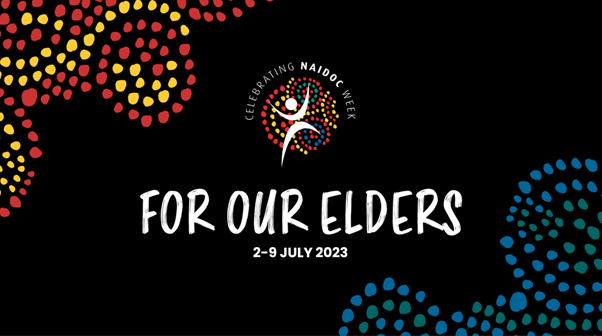
National Aboriginal and Torres Strait Islander Week (more commonly known as National NAIDOC Week), celebrates and recognises the history, culture and achievements of Aboriginal and Torres Strait Islander peoples, providing an important opportunity for all Australians to learn about First Nations cultures and histories.
The theme for 2023 is FOR OUR ELDERS and will be held across Australia from 2-9 July. The theme this year was chosen because across every generation, Elders have played, and continue to play, an important role and hold a prominent place in communities and families. Elders are the cultural knowledge holders, trailblazers, nurturers, advocates, teachers, survivors, leaders, hard works and loved ones. It is the influence from Elders through their learnings that supports future decision making for First Nations people and this year homage is paid to them.
Here are some ways you can get involved!
- Download and display this year’s NAIDOC Week poster
- Subscribe to the NAIDOC week newsletter
- Learn more about the Country on which you live and work using the AIATSIS Map
- Organise a Welcome to Country for an event
- Learn more about how to deliver an Acknowledgement of Country
- Join the conversation online through NAIDOC socials
National NAIDOC Week has a very important history to understand. Intended as a summary of the key dates only:
1920 – 1930
Before the 1920s, Aboriginal rights groups boycotted Australia Day (26 January) in protest against the status and treatment of Indigenous Australians but by the 1920s they were increasingly aware that the broader Australian public were largely ignorant of the boycotts. Several organisations attempted to drive change, but their efforts were largely overlooked, and due to police harassment, the work was abandoned in 1927.
1935
William Cooper drafted a petition to send to King George V, asking for special Aboriginal electorates in Federal Parliament. However, the Australian Government believed that the petition fell outside its constitutional responsibilities.
1938
On Australia Day (26 January), 1938, protestors marched through the streets of Sydney, followed by a congress attended by over a thousand people. This was one of the first major civil rights gatherings in the world and was known as the Day of Mourning.
A national policy for Aboriginal people was again proposed, but it was rejected again because the Australian Government did not hold constitutional powers in relation to Aboriginal people.
1940 – 1955
From 1940 until 1955, the Day of Mourning was held annually on the Sunday before Australia Day and was known as Aborigines Day. In 1955 Aborigines Day was shifted to the first Sunday in July after it was decided the day should become not simply a protest but also a celebration of Aboriginal culture.
1956 – 1990
Major Aboriginal organisations, state and federal governments, and several church groups supported the formation of the National Aborigines Day Observance Committee (NADOC). At the same time, the second Sunday in July became a day of remembrance for Aboriginal people and their heritage.
In 1972, the Department of Aboriginal Affairs was formed as an outcome of the 1967 referendum.
In 1974, the NADOC committee was composed entirely of Aboriginal members for the first time and in the following year, it was decided that it should cover a week, the first to second Sunday in July.
In 1984, NADOC asked that National Aborigines Day be made a national public holiday to help celebrate and recognise the rich cultural history that makes Australia unique.
1991 – Present
With a growing awareness of the distinct cultural histories of Aboriginal and Torres Strait Islander peoples, NADOC was expanded to recognise Torres Strait Islander people and culture. The committee then became known as the National Aborigines and Islanders Day Observance Committee (NAIDOC).
Recognition towards the materials on which were used to prepare this summary article.
Article by: Courtenay Zajicek, Committee Member, ACC Australia Diversity, Equality and Inclusion Special Interest Group


ACC Australia is committed to promoting a diverse and inclusive in-house profession and has created the Diversity, Equality and Inclusion (DEI) Special Interest Group. If you are interested in participating in the special interest group or contributing ideas, please contact k.floyd@accglobal.com.